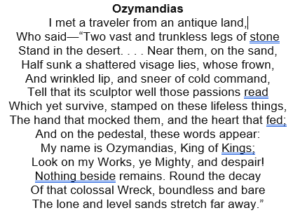Not All Authoritarians Are Divine
A favorite poem of mine in high school was Ozymandias, by Percy Bysshe Shelley. I knew the poem was based on an ancient Egyptian ruler, but until I read a recent book by Toby Wilkinson titled Ramesses the Great: Egypt’s King of Kings, I didn’t realize that even the name of the poem’s king came from historical archives.
When Ramesses II succeeded his father, Seti I, he chose for his throne name Usermaatra, which combines the words for powerful, chosen and the name of the sun god Ra. The 1st Century BCE Greek historian Diodorus Siculus referred to Ramesses by a Greek version of his throne name Osymandyas, hence the title of Shelley’s poem.
Ramesses II ruled from 1279-1213 BCE, longer than any other Egyptian king. Early in his reign he led his army in a battle against the Hittites for control of the city of Kadesh, located in western Syria. Ramesses’ forces were tricked by a Hittite spy whose misinformation led the Egyptians into a trap. The battle eventually ended in a draw and a peace treaty, yet Ramesses presented it as a great victory to enhance his reputation. Over the next 60 years of his reign he created colossal statues of himself and countless building projects throughout his empire always inscribing, on walls and columns, details of his great victory at Kadesh.
Over the centuries, man and nature reduced many of Ramesses’s monuments to rubble or reuse in later structures. Shelley’s poem envisions a ruined statue of Ramesses II with only its lower torso and legs remaining. The poem, printed here, is in the form of a 14-line sonnet.  “Nothing beside remains” exposes the ephemeral nature of great power. Like King Charles I, as described in my essay, “A Warning From 17th Century England,” Ramesses was an authoritarian ruler who believed his power was divinely ordained. The 21st Century has no Ramesses II or King Charles I claiming divine authority, but authoritarianism is on the rise globally. Concentration of power in an authoritarian leader can descend into despotism. Authoritarianism threatens the power of courts, legislatures, ballot box, and democracy.
“Nothing beside remains” exposes the ephemeral nature of great power. Like King Charles I, as described in my essay, “A Warning From 17th Century England,” Ramesses was an authoritarian ruler who believed his power was divinely ordained. The 21st Century has no Ramesses II or King Charles I claiming divine authority, but authoritarianism is on the rise globally. Concentration of power in an authoritarian leader can descend into despotism. Authoritarianism threatens the power of courts, legislatures, ballot box, and democracy.
